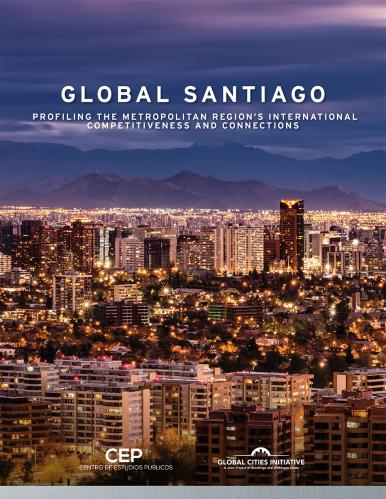A few weeks ago members of the Metropolitan Policy Program had the opportunity to sit down with high ranking officials, members of the private sector, entrepreneurs, and other stakeholders to discuss the competitive position of the Santiago Metropolitan Region. Declines in commodity prices, a slowdown in China (a key export market for Chile), and the faltering economies of Chile’s neighbors provided an urgent backdrop to talk about new avenues for economic growth.
As we recently highlighted in our report Global Santiago, the region has competitive assets to support a transition toward an economy that generates value through knowledge and innovation. Anchored by two world class research universities, a relatively well-educated workforce, and a favorable macroeconomic and regulatory environment, Santiago has the necessary elements to become the innovation hub of South America.
In fact, great progress has been made over the past five years. While venture capital investment in Santiago is still low compared to well-developed markets in the United States and Europe, it registered 110 percent growth between 2009 and 2014. Further, a recent study by the entrepreneurship nonprofit Endeavor found that more than half of the most important startups in the region were founded between 2010 and 2015.
Behind the success of Santiago is a concerted effort of both the private and the public sector to support entrepreneurship. Perhaps the most well-known example isStartup Chile. As our Brookings colleagues document, the program was launched in 2010 with the objective of attracting early stage firms from all over the world by providing equity-free financing and access to a six-month incubation program. As of 2015 the program has helped more than 1,000 firms from 72 different countries.
The efforts of public officials to develop a vibrant innovation ecosystem have been matched by a new generation of audacious entrepreneurs like Alejandra Mustakis. In 2011, she founded Ideas Factory (IF)—a unique combination of makers’ space, incubator, accelerator, and shared workspace—to challenge the notion that innovation is limited to the IT sector. Ideas Factory boasts a mixture of traditional industries, such as wood and electronics manufacturing, along with software design firms, as well as projects related to social innovation. The mixture of industries that traditionally innovate in isolated research facilities and young entrepreneurial firms has produced new forms of collaboration. It’s not uncommon to see a multinational company with manufacturing facilities in several countries collaborating with entrepreneurs to develop, improve, and commercialize ideas such as a Chilean-made 3-D printer.
Ideas Factory’s success has bred replication. With the support of established media companies like El Mercurio, it has opened a second space in Santiago focused on media and digital entertainment; an additional space in Valparaiso was recently opened as a joint project with the University of Valparaiso.
As we’ve noted previously, cities looking to develop their cluster of startups to compete globally need to adopt a distinctive model to foster their innovation ecosystem. In Santiago both the government and the private sector have adopted an approach that aims to bring together traditional companies alongside highly disruptive business models. The now internationally recognized term “Chilecon Vallley” suggests that innovation with a Latin American touch is possible.
The Brookings Institution is committed to quality, independence, and impact.
We are supported by a diverse array of funders. In line with our values and policies, each Brookings publication represents the sole views of its author(s).










Commentary
Santiago’s innovative startup scene a new avenue for economic growth
May 4, 2016